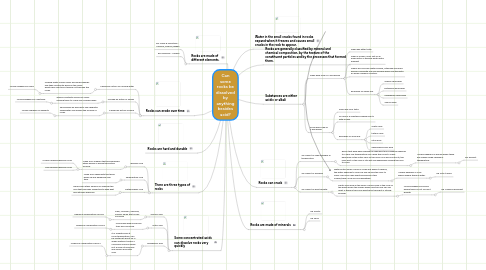
1. Rocks are hard and durable
2. There are three types of rocks
2.1. Igneous rock
2.1.1. Made from magma that has hardened either below or above the earth's surface.
2.1.1.1. Coarse-grained igneous rocks
2.1.1.2. Fine-grained igneous rocks
2.2. Sedimentary rock
2.2.1. Made from sediments that have pilled up and hardened over time.
2.3. Metamorphic rock
2.3.1. Made from either Igneous or sedimentary rock that has been subjected to high heat and extreme pressure.
3. Rocks can erode over time
3.1. Caused by action of running water
3.1.1. Flowing water carries rocks and small pebbles and they constantly grind on the rocks. Eventually over time it would cut through the rocks.
3.1.1.1. Usually happens in rivers
3.2. Caused by action of waves
3.2.1. Waves constantly pound on rocks causing them to crack and crumble away.
3.2.1.1. Usually happens in coastlines
3.3. Caused by action of wind
3.3.1. Sand blown by wind acts like a gigantic sandblaster and erodes the surface of rocks.
3.3.1.1. Usually happens in desserts
4. Rocks are made of different elements.
4.1. Eg. Chalk & limestone - Calcium,Carbon,oxygen
4.2. Eg. Diamond - Carbon
5. Some concentrated acids can dissolve rocks very quickly
5.1. Sulfuric acid
5.1.1. clear, colorless, odorless, viscous liquid that is very corrosive
5.1.1.1. Chemical composition:H2SO4
5.2. Nitric acid
5.2.1. Colourless when pure very toxic and corrosive
5.2.1.1. Chemical composition:HNO3
5.3. Phosphoric acid
5.3.1. It is a white solid at room temperature. Can be melted at about 43°C. When melted it forms a colourless viscous liquid. Not a really strong acid like sulfuric and nitric acid.
5.3.1.1. Chemical composition:H3PO4
6. Water in the small cracks found in rocks expand when it freezes and causes small cracks in the rock to appear.
7. Rocks can crack
7.1. As a result of large changes in temperature
7.1.1. Rocks that have been exposed in high heat and suddenly exposed to a very low temperature can cause the rocks to crack beacause as the outer layer of the rocks cool and contracts, the inner part of the rock is still hot and expanding causing the rock to crack.
7.1.1.1. Usually happens in places where there are sudden huge change in temperature.
7.1.1.1.1. Eg. Dessert
7.2. As a result of freezing
7.2.1. Water enters small cracks in rocks and when it freezes, the water expands to form ice and causes the rock to crack. The rocks may eventually break if this "freeze,thaw" cycle occurs repeatedly.
7.2.1.1. Usually happens in cold places where there is water.
7.2.1.1.1. Eg. Artic tundra
7.3. As a result of plant growth
7.3.1. Plants may grow in the small cracks found in the rock as the plant grows the cracks widen and the rock can fall apart if there is the force exertrd by the plant is strong enough
7.3.1.1. Usually happens in places where there is a lot of plant growth
7.3.1.1.1. Eg. Tropical rainforest
8. Rocks are made of minerals
8.1. Eg. quartz
8.2. Eg. sand
9. Substances are either acidic or alkali
9.1. Alkali have a ph of 7 and above
9.1.1. Alkali has bitter taste
9.1.2. Alkali is a basic, ionic salt of an alkali metal or alkaline earth metal element
9.1.3. Alkalis are normally water soluble, although some like barium carbonate are only soluble when reacting with an acidic aqueous solution.
9.1.4. Examples of alkalis are.
9.1.4.1. sodium hydroxide
9.1.4.2. potassium hydroxide
9.1.4.3. magnesium hydroxide
9.1.4.4. Salsola soda
9.2. Acids have a ph of 7 and below
9.2.1. Acids has sour taste
9.2.2. An acid is a substance which reacts with a base.
9.2.3. Examples of acids are.
9.2.3.1. acetic acid
9.2.3.2. tartaric acid
9.2.3.3. citric acid
9.2.3.4. deoxyribonucleic acid
